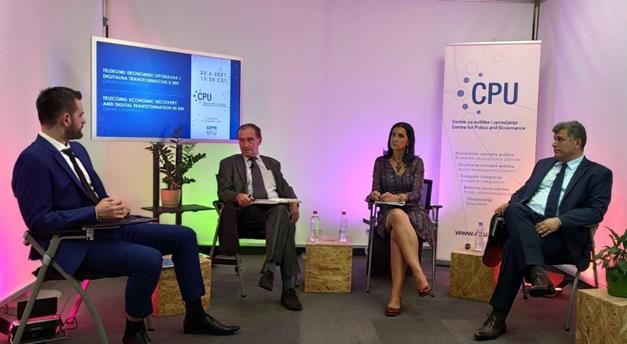
On June 23rd, an international online conference titled: "Response to Crisis: Maximizing the Telecoms' Contribution to Economic Recovery and Digital Transformation in BiH" was held in Sarajevo, organized by the Centre for Policy and Governance, with the support of the Center for International Private Enterprise (CIPE) from the United States.
The goal of this event was to point out, with the help of domestic and international experts, representatives of the telecommunications industry, and relevant decision-makers in this sector, the importance of the telecommunications industry in BiH, as well as global and regional trends and challenges that has impacted this sector in the recent period.
In the introductory part of the conference, on behalf of the Centre for Policy and Governance,the Chairman of the Board, Mr. Haris Abaspahić stated that, "Rapid technological progress brings changes to the way companies, governments and several other sectors, such as education, healthcare, and others, operate. Institutions are increasingly dependent on accessible, affordable, and reliable high-speed Internet, as well as on a range of digital services and solutions. In this context, the telecommunications sector is gaining strategic importance for the development of economy and society as a whole. The maintenance of numerous business activities and quality of public services depend on the availability and reliability of their connectivity, and precisely because of its strategic importance, the conference aims to inform general public and decision-makers about global trends in this context, as well as about the priorities and instruments of the EU and the US support. The first, international panel discussed global and regional trends in the sector, as well as priorities and instruments of EU and US support available to Bosnia and Herzegovina and tothe countries of the region.
In the second, domestic panel, participants discussed the question of what needs to be the Bosnia and Herzegovina’s answer to all the challenges and opportunities related to further development of the sector.
This first thematic conference of the telecommunications sector in BiH brought together the key decision makers in BiH, who opened, together with experts in this field, an important dialogue on increasing productivity and progress of the digital economy in BiH. The Centre for Policy and Governance, which brought together BiH economic and other experts, has been successfully cooperating with regional and international experts for many years, and will continue to address the telecommunications sector in its further work as the crucial topic for Bosnia and Herzegovina's economic and social development.
Key statements from the Panelists – high-ranking officials
Paul Harrison, Acting Director of the Division of International Communications and Information of the United States, Department of State, underscored the security risks associated with the selection of technological solutions posed by unverified providers. He also mentioned the US Government's priorities for promoting competitive and secure networks, including 5G, and preventing the malignant effects of undemocratic regimes by creating broader international coalitions to promote democratic values - primarily through the protection of telecommunications services and supporting infrastructure.
The European Commission’s official, Philippe Gerard, Adviser for Capacity-Building and Cooperation with Third Countries, Directorate-General for Communications Networks, Content and Technology (DG CNECT), commented on the implementation of the Digital Agenda for Europe, as one of the key strategic priorities of the European Union. He welcomed the progress in the implementation of the Digital Agenda for the Western Balkans, and the possible elimination of roaming, i.e. regional cooperation of telecommunications operators. He presented the instruments of support that the European Union has made available to BiH and the countries of the region - he emphasized that the political representatives will discussits political aspects at the upcoming summit in Berlin at the beginning of July this year.
Terry Halvorsen, General Manager for Client & Solutions Development, Federal and Public Sector from IBM US looked back at global trends in the telecommunications sector. He emphasized the importance of cooperation between the government and the private sector in the context of developing critical infrastructure, and stressed that investing in critical infrastructure, although it seems to be very costly initially, prove to be worthwhile investments in the long run. He also referred to the risks related to strategic investments in infrastructure. Furthermore, he said that the COVID-19 pandemic has brought significant changes in the way companies do business: agility in adjusting the way they do business, and pointed out that things will not go back to normal. The growing dependence on Internet services requires agile telecoms, which are ready to adapt to users and their needs.
The presentation from Sanja Ribar, Regional Senior Manager for Telecoms (Ernst & Young), was focused on reviewing the key trends in the telecommunications sector in the region. In the first part of her presentation, she gave an overview of the market, with special focus on broadband coverage. She listed the following key challenges for the functioning of telecoms, i.e. adequate cooperation of telecoms with the government and regulators, network planning and deployment, vertical connection of telecom operators, pressures for profit creation, protection of users and their expectations, as well as digital transformation of telecoms.
In the second panel, the speakers are: Nedžad Branković, Deputy Minister, Ministry of Communications and Transport of BiH, Miloš Šolaja, member of the Council of the Communications Regulatory Agency of BiH, Aida Soko, Advisor to the Prime Minister of the FBiH, Adnan Huremović, Executive Director for Technology and Development of BH Telecom, Alen Muslić, Executive Vice President of ZIRA. Participants discussed Bosnia and Herzegovina’s response to all the challenges and opportunities related to the further development of this sector.
Nedžad Branković, Deputy Minister of Communications and Transport of BiH, pointed out in his video address that the indicators for Bosnia and Herzegovina in the areas that are the prerequisite for the development of digital society and economy clearly indicate that we are significantly behind the developed countries, and have been recording a significant annual decline. Of course, these indicators are also an incentive for BiH to catch up with the modern world, which requiresa strong and synergistic action of all stakeholders, and strong support from all levels of government. He listed the strategic documents, decisions and legal solutions that the BiH Ministry of Communications and Transport and the Council of Ministers of BiH adopted, developed, or are developing, in cooperation with international partners, and that are being prepared for or submitted to the parliamentary procedure for adoption.
Miloš Šolaja, a member of the Council of the Communications Regulatory Agency of BiH, noted in the context of digitalization that it was extremely slow in the previous period, and that the first steps in the digitalization of the television signal have not been completed. He emphasized the importance of the regulator’s independence, and added that the regulator is able to adapt to new circumstances, if it is enabled to work professionally and smoothly.
In her presentation, Aida Soko, the Advisor to the Prime Minister of the FBiH, referred to the situation with the state-owned enterprise sector, and to the activities undertaken by the Government of FBiH in this area. She pointed at the need to define strategic branches in which the state should have a majority share in company ownership, and that the performance of telecoms cannot be viewed exclusively through the prism of financial indicators, but also in view of security, digitalization and other elements of strategic importance. She emphasized that the telecommunications market in BiH is relatively small, and that the interest of large investors is limited,and the potential effects of the change in ownership structure on the strategic development of the sector. She also highlighted the need to redefine the concept of state ownership and restructure companies in this context. Finally, she pointed at the need for a greater transparency and availability of data in this sector.
Adnan Huremović, Director for Technology and Development of BH Telecom Services, commented on the challenges that BH Telecom and other operators have faced during the pandemic, and the fact that traffic in the past period increased by more than 60%. He pointed out that BH Telecom adapted quickly to these challenges. In the context of development of future infrastructure, he pointed out the barriers they face in dealing with some institutions and local communities. He noted that further development of the broadband network is one of the obvious priorities. On the other hand, he pointed at the situation in the market where data traffic prices are decreasing and users are becoming more demanding in the context of security and reliability of services. He added that BH Telecom is entering three new business areas: the FinTech services sector, content development, and supporting innovative digital start-up companies.
Alen Muslić, CEO of ZIRA, commented on the challenges facing a company that is a very demanding user of telecom services, and explained how their way of doing business with customers in over 30 countries has changed during the COVID-19 pandemic. He shared his experience in working in some of the most demanding telecommunications markets, and how telecoms support,in an innovative way, those demanding users with a wide range of services.

